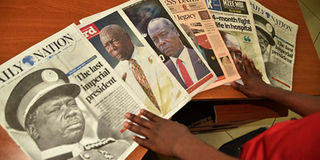Happening Now: Trump takes the lead in US presidential race
Let us strive to build respect for intellectual property in Kenya

Being literary works, newspapers are protected by copyright. PHOTO | FILE | NATION MEDIA GROUP
What you need to know:
- To share articles, one requires the express authority of the rights holder — the media company that owns the newspaper.
- For the few who are in it for commercial purposes, there shall eventually be civil and criminal consequences for infringing the author’s rights.
One of the unintended impacts of the measures enforced by government to manage Covid-19 is the return of the newspaper forwards through PDF format on social media.
These infringe on intellectual property rights (IPR), including copyright, protected under Articles 11 and 40 of the Constitution, which place an obligation on the government to support, promote and protect them.
Intellectual property is an internationally agreed system of incentives to support creators and innovators to release products useful for improved human experience.
The types recognised under the Kenyan legal system include patents, trademarks, copyright and design rights.
The Constitution and laws extend this obligation to corporate bodies and individuals based or domiciled in Kenya — and foreign entities by virtue of international treaties and conventions.
Each IPR system consists of exclusive rights that belong to the authors and inventors or their corporate employers. Any infringing party becomes liable to criminal and civil action.
PIRACY
It is relied on by sectors that are shaped by cutting-edge knowledge produced by costly research and development — including ICT, publishing and pharmaceuticals. The exclusivity offered by the law is a key consideration for potential investors in a country.
Copyright law protects products of authorship in the form of music, film, publishing and other arts.
The products of this sector support our education, offer pleasure and cumulatively constitute culture, called the “cultural industries”.
The main right in the copyright law is the one to ‘copy’ that authors and owners hold. The copies are made available for sale and distribution by the owner to extract the economic value in the market during the period of exclusive rights.
This applies for both analogue and digital works. Where copies are made with the owner’s authority, it is legal.
I have credible reports that the upsurge is pushed by a few people who have knowingly set up the download and distribution of newspapers online for commercial purposes.
Being literary works, newspapers are protected by copyright. Those who publish and organise them do so at great expense and deserve their just reward just like all others.
The unauthorised access onto the online platforms of the mainstream media is an infringement of copyright, or piracy.
It is a criminal offence of circumvention of technical protection devices by way of hacking into ICT systems, making copies by downloading newspaper files and selling or illegal distribution of the illegally obtained content through all forms of social media and emails.
LOSS OF BUSINESS
To share articles thus, one requires the express authority of the rights holder — the media company that owns the newspaper.
Unfortunately, these acts of piracy are observed in the trade in PDF versions of books through the same platforms.
This article is, therefore, intended to serve two principal purposes. The first is to raise awareness of Kenyans who may have unknowingly participated in piracy, which have a deleterious impact on journalists who author the content and look forward to stable employment at the media house.
I constantly recall the expressions of indignation every time a fundraising is required to give a decent funeral for many a renowned author and remind all of us that this is the result.
Secondly, for the few who are in it for commercial purposes, there shall eventually be civil and criminal consequences for infringing the author’s rights.
Respect for copyright and other IPRs is a pillar for Kenya to grow as a knowledge-driven economy that fulfils its potential in creativity, innovation and research, an abundance of which Covid-19 has shown.
The consequences of piracy are being felt by the publishing sector, and will be for many years. It is time we bought genuine copyright and other products and avoided acts that damage our economy.
Mr Sigei is the executive director, Kenya Copyright Board (Kecobo). [email protected].




